Skip to main content

Items
-
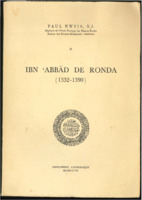 Nwyia, Paul. Ibn 'Abbad de Ronda, 1332-1390: un mystique prédicateur à la Qarawiyin de Fès (Beyrouth: Impr. catholique, [1961]). Thomas Merton's Marginalia Collection.
Nwyia, Paul. Ibn 'Abbad de Ronda, 1332-1390: un mystique prédicateur à la Qarawiyin de Fès (Beyrouth: Impr. catholique, [1961]). Thomas Merton's Marginalia Collection.
-
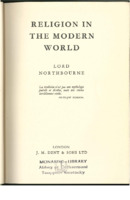 Northbourne, Lord, 1896-1982. Religion in the modern world (London: J.M. Dent, [1963]). Thomas Merton's Marginalia Collection.
Northbourne, Lord, 1896-1982. Religion in the modern world (London: J.M. Dent, [1963]). Thomas Merton's Marginalia Collection.
-
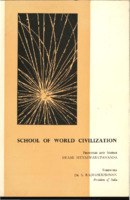 Nityaswarupananda, Swami. School of world civilization, for the study of mankind's cultural and scientific development from the universal standpoint; principles and scheme (New Delhi: Ramkrishna Mission, [1967]). Thomas Merton's Marginalia Collection.
Nityaswarupananda, Swami. School of world civilization, for the study of mankind's cultural and scientific development from the universal standpoint; principles and scheme (New Delhi: Ramkrishna Mission, [1967]). Thomas Merton's Marginalia Collection.
-
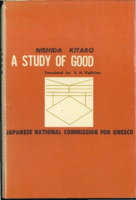 Nishida, Kitaro, 1870-1945. A study of good (Tokyo: Print Bureau, Japanese Government, 1960). Thomas Merton's Marginalia Collection.
Nishida, Kitaro, 1870-1945. A study of good (Tokyo: Print Bureau, Japanese Government, 1960). Thomas Merton's Marginalia Collection.
-
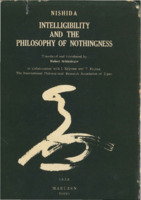 Nishida, Kitaro, 1870-1945. Intelligibility and the philosophy of nothingness: three philosophical essays; translated and introduced by Robert Schinzinger in collaboration with I. Koyama and T. Kojima (Tokyo: Maruzen, 1958). Thomas Merton's Marginalia Collection.
Nishida, Kitaro, 1870-1945. Intelligibility and the philosophy of nothingness: three philosophical essays; translated and introduced by Robert Schinzinger in collaboration with I. Koyama and T. Kojima (Tokyo: Maruzen, 1958). Thomas Merton's Marginalia Collection.
-
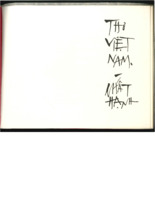 Nhât Hanh, Thích - The Viet Nam [Vietnam Poems] (Santa Barbara: Unicorn Press, [1967]). Thomas Merton's Marginalia Collection.
Nhât Hanh, Thích - The Viet Nam [Vietnam Poems] (Santa Barbara: Unicorn Press, [1967]). Thomas Merton's Marginalia Collection.
-
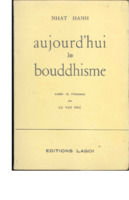 Nhât Hanh, Thích. Aujourd'hui le bouddhisme (Saigon, Cholon: Lá Bó̂i, 1965). Inscribed by the author to Thomas Merton. Thomas Merton's Marginalia Collection.
Nhât Hanh, Thích. Aujourd'hui le bouddhisme (Saigon, Cholon: Lá Bó̂i, 1965). Inscribed by the author to Thomas Merton. Thomas Merton's Marginalia Collection.
-
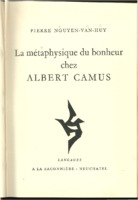 Nguyen-van-Huy, Pierre. Métaphysique du bonheur chez Albert Camus (Neuchâtel: La Baconnière, 1962). Thomas Merton's Marginalia Collection.
Nguyen-van-Huy, Pierre. Métaphysique du bonheur chez Albert Camus (Neuchâtel: La Baconnière, 1962). Thomas Merton's Marginalia Collection.
-
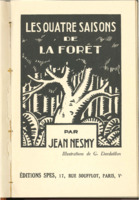 Nesmy, Jean. Les quatre saisons de la forêt (Paris: Spes, 1926). Inscribed by the author to Thomas Merton. Thomas Merton's Marginalia Collection.
Nesmy, Jean. Les quatre saisons de la forêt (Paris: Spes, 1926). Inscribed by the author to Thomas Merton. Thomas Merton's Marginalia Collection.
-
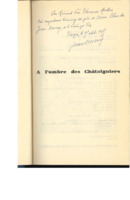 Nesmy, Jean. A l'ombre des Châtaigniers (Paris: Spes, [1929]). Inscribed by the author to Thomas Merton. Thomas Merton's Marginalia Collection.
Nesmy, Jean. A l'ombre des Châtaigniers (Paris: Spes, [1929]). Inscribed by the author to Thomas Merton. Thomas Merton's Marginalia Collection.
 Nwyia, Paul. Ibn 'Abbad de Ronda, 1332-1390: un mystique prédicateur à la Qarawiyin de Fès (Beyrouth: Impr. catholique, [1961]). Thomas Merton's Marginalia Collection.
Nwyia, Paul. Ibn 'Abbad de Ronda, 1332-1390: un mystique prédicateur à la Qarawiyin de Fès (Beyrouth: Impr. catholique, [1961]). Thomas Merton's Marginalia Collection.  Northbourne, Lord, 1896-1982. Religion in the modern world (London: J.M. Dent, [1963]). Thomas Merton's Marginalia Collection.
Northbourne, Lord, 1896-1982. Religion in the modern world (London: J.M. Dent, [1963]). Thomas Merton's Marginalia Collection.  Nityaswarupananda, Swami. School of world civilization, for the study of mankind's cultural and scientific development from the universal standpoint; principles and scheme (New Delhi: Ramkrishna Mission, [1967]). Thomas Merton's Marginalia Collection.
Nityaswarupananda, Swami. School of world civilization, for the study of mankind's cultural and scientific development from the universal standpoint; principles and scheme (New Delhi: Ramkrishna Mission, [1967]). Thomas Merton's Marginalia Collection.  Nishida, Kitaro, 1870-1945. A study of good (Tokyo: Print Bureau, Japanese Government, 1960). Thomas Merton's Marginalia Collection.
Nishida, Kitaro, 1870-1945. A study of good (Tokyo: Print Bureau, Japanese Government, 1960). Thomas Merton's Marginalia Collection.  Nishida, Kitaro, 1870-1945. Intelligibility and the philosophy of nothingness: three philosophical essays; translated and introduced by Robert Schinzinger in collaboration with I. Koyama and T. Kojima (Tokyo: Maruzen, 1958). Thomas Merton's Marginalia Collection.
Nishida, Kitaro, 1870-1945. Intelligibility and the philosophy of nothingness: three philosophical essays; translated and introduced by Robert Schinzinger in collaboration with I. Koyama and T. Kojima (Tokyo: Maruzen, 1958). Thomas Merton's Marginalia Collection.  Nhât Hanh, Thích - The Viet Nam [Vietnam Poems] (Santa Barbara: Unicorn Press, [1967]). Thomas Merton's Marginalia Collection.
Nhât Hanh, Thích - The Viet Nam [Vietnam Poems] (Santa Barbara: Unicorn Press, [1967]). Thomas Merton's Marginalia Collection.  Nhât Hanh, Thích. Aujourd'hui le bouddhisme (Saigon, Cholon: Lá Bó̂i, 1965). Inscribed by the author to Thomas Merton. Thomas Merton's Marginalia Collection.
Nhât Hanh, Thích. Aujourd'hui le bouddhisme (Saigon, Cholon: Lá Bó̂i, 1965). Inscribed by the author to Thomas Merton. Thomas Merton's Marginalia Collection.  Nguyen-van-Huy, Pierre. Métaphysique du bonheur chez Albert Camus (Neuchâtel: La Baconnière, 1962). Thomas Merton's Marginalia Collection.
Nguyen-van-Huy, Pierre. Métaphysique du bonheur chez Albert Camus (Neuchâtel: La Baconnière, 1962). Thomas Merton's Marginalia Collection.  Nesmy, Jean. Les quatre saisons de la forêt (Paris: Spes, 1926). Inscribed by the author to Thomas Merton. Thomas Merton's Marginalia Collection.
Nesmy, Jean. Les quatre saisons de la forêt (Paris: Spes, 1926). Inscribed by the author to Thomas Merton. Thomas Merton's Marginalia Collection.  Nesmy, Jean. A l'ombre des Châtaigniers (Paris: Spes, [1929]). Inscribed by the author to Thomas Merton. Thomas Merton's Marginalia Collection.
Nesmy, Jean. A l'ombre des Châtaigniers (Paris: Spes, [1929]). Inscribed by the author to Thomas Merton. Thomas Merton's Marginalia Collection. 